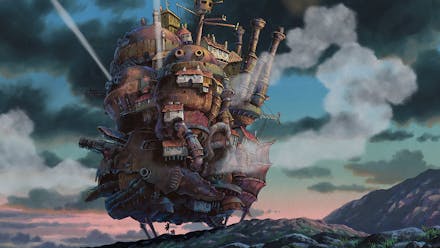A few years ago, the standard perception of Japanese anime was of strange, noisy cartoons that made no sense. Anime fans would always respond in the same way: they’d point to the delightful and brilliant early films of Hayao Miyazaki, such as My Neighbour Totoro and Kiki’s Delivery Service, with their thoroughly simple, lucid storytelling. Then Miyazaki’s Spirited Away won an Oscar and suddenly everyone was a fan – despite complaints that his movies weren’t so clear any more.
The irony is, now we’ve got a Miyazaki film in multiplexes, excellently dubbed by an A-list cast (with a subtitled version simultaneously released for purists), the director’s abandoned clarity altogether. To most viewers, Howl’s Moving Castle will prompt the same response that Lewis Carroll’s Alice had to the Jabberwocky poem: “It seems very pretty but it’s rather hard to understand.” That didn’t worry Japanese audiences, who made Howl a monster hit, but Western viewers may have less patience.
Fortunately, Howl is as much of a hand-drawn treat as Spirited Away, chock-full of numinous sunsets, fabulous organic machinery and gratuitously delightful touches. The Gilliamesque walking castle of the title is a star, stomping over hills like a misshapen dragon, but so is the wheezing little dog that pops up midway. Western viewers may find the European landscapes (based on Alsace in ) less exotic than the oriental bathhouse in Spirited Away, but a Freudian dream-cave where the heroine unearths Howl’s true nature is as gorgeous an image as any in fantasy cinema, giving evocative power to an oblique love story.
On the downside, it’s hard to tell if Miyazaki is playing silly buggers with expectations or has given up on plot altogether while heavily reworking this book by the fiendishly clever British kid’s writer Diana Wynne Jones. The demonic war glimpsed throughout is little more than window-dressing (even though Miyazaki saw air-raids as a child and war-on-terror allegories are there for the taking), while the underlying parallels are with Peter Pan (a flying hero with arrested development) and Eternal Sunshine Of The Spotless Mind (a relationship turned into an out-of-synch odyssey). An outrageous cop-out ending sees castle and plot collapse in a way that may please avant-gardists, but it’ll infuriate mainstream viewers who’ve been patiently waiting for things to come together.







